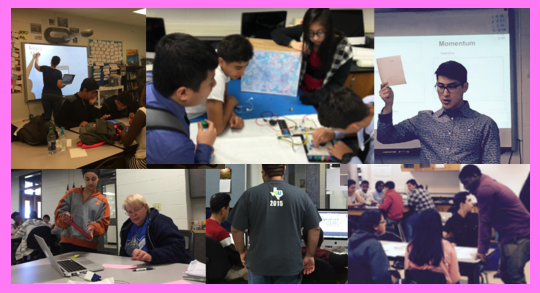
.


Anticipating Your Role: Critical tasks include:
- Orient students into project at the beginning and throughout the project
- Remind students of project goals and expectations (using Driving Question)
- Track and coach students to progress through projects
- Communicate next steps
- Remind students of the time and effort needed to be successful
- Form students into appropriate groups for appropriate tasks
- Teach students collaboration skills needed to collaborate effectively
- Organize project on a daily basis by narrowing scope of inquiry and suggesting ways to approach problems
- Setting and enforcing deadlines
- Providing timely formative feedback to students that they can use to improve understandings and products
- Clarify learning goals and high priority tasks
- Monitor and regular student behavior
- Train students how to work effectively with less supervision
- Help students manage projects with deadlines, daily log sheets, etc
- Manage the work flow
- Facilitate “just in time” instruction
- Monitor student progress on products
- Evaluate the success of the project
- Help students realize what they have learned (and not) during project
Key Steps
- Share Project Goals with Students
- Share project goals and how they relate to students’ lives “now” and in the future
- Use student feedback to improve project vision
- Use Problem-Solving Tools
- Know and Need-to-Know List
- Aim to be very inclusive
- Complete list of related students students understand (Knows)
- Complete list of investigations needed to complete project (Need-to-Knows)
- Learning Logs
- Daily journal that describe students learning, processes and frustrations
- Planning, investigation and product briefs
- Graphic organizers that focus students on key information and processes
- Know and Need-to-Know List
- Use Checkpoints and Milestones
- Ask group leaders to give informal briefings on team progress
- Use quick writes to assess students understandings and questions
- Interview randomly selected students
- Survey students
- Schedule regular reflection sessions
- Review checklists of project process steps
- Examine team work logs
- Observe teams to monitor their progress
- Conduct debriefing sessions after activities
- Things to notice:
- problems in carrying out activities
- team accomplishments
- motivation and participation of students
- problems and successes of specific activities
- unexpected accomplishments
- student needs for instructional support
- Plan for Evaluation and Reflection
- Guide students to analyze what they learned and how they learned it
- Guide students to reflect on how they can apply what they know to new contexts
- Questions to ask during project debriefs:
- What did we learn in this project?
- Did we collaborate effectively?
- What skills did we learn?
- What skills did we get to practice?
- What was the quality of our work?
- How can we improve?
- Share results of debrief with students
- Formats for project debriefs
- whole class debriefing session
- use prescribed debrief questions and a student facilitator
- fishbowl discussion
- half the class discusses in center of room
- other half observes and takes notes and occasionally takes turns being in the inner discussion circle
- surveys
- don’t forget to summarize survey data and share results with students
- self evaluations
- for more ideas, see this article: Alternate question response formats and Teaching students how to generate questions
- whole class debriefing session
- Celebrate
- help students to acknowledge what they accomplished
- includes parents and other project stakeholders

Teachers need to skillfully wear many hats while successfully facilitating a project. In addition to teaching content, teachers need to model, teach, and guide students in project management skills, collaboration skills and problem solving skills. The roles and tasks described in the articles describes some of the key things teachers need to do to successfully implement a standards-based project.

Preparation Steps
- Create a checklist of teacher tasks that go with key roles: coach, instructor, project manager, collaboration coach, problem solving coach, etc. See list above for ideas.
- Plot project facilitator tasks on project calendar
Early Implementation Steps
- Implement scaffolding and assessment activities in project calendar
- Regularly get students to become aware of project goals and their progress toward these
- Regularly let students reflect on what they learning in the project, how they are learning, and what more they need to learn to make progress
- Regularly provide formative feedback that students can use to improve their understandings, skills, and products
Advanced Implementation Steps
- Create a master list of tasks that go with the many hats of an excellent project facilitator. Make them into a laminated checklist board that can be referred to throughout the progress to make sure key tasks are implemented
- Build in key tasks that student reflections have proven to be effective into routines

- PBL articles
- Assessments articles
- Scaffolding articles
- Learning targets
- Assessments data base
